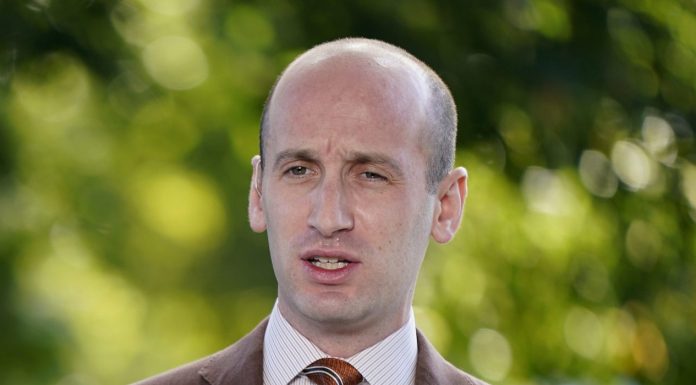(Headline USA) One of President Donald Trump’s top priorities on immigration if he wins a second term would be to use agreements with Central American governments as models to get countries around the world to field asylum claims from people seeking refuge in the United States, a top adviser said.
Stephen Miller, a key architect of Trump’s immigration policies, said Friday the agreements would help stop “asylum fraud, asylum shopping and asylum abuse on a global scale.”
Miller, in an interview with The Associated Press, also forecast a broader offensive against so-called “sanctuary” jurisdictions that limit cooperation with federal immigration authorities, saying the administration would use its “full power, resources and authority.”
He vowed more efforts toward legal immigration “based on merit.”
The “Asylum Cooperative Agreements” that the administration struck in 2019 have allowed for asylum seekers from El Salvador and Honduras to be flown to Guatemala for an opportunity to seek asylum rather than violating U.S. law by stealing across the southern border with Mexico.
However, the coronavirus struck before flights began to Honduras and El Salvador, putting those launches on hold.
From November to March, when the coronavirus pandemic halted flights to Guatemala, only 20 of 939 Hondurans and El Salvadorans flown there sought asylum. Nearly all went home in what became known as “deportation with a layover.”
Like many of Trump’s policies that have dramatically transformed the widely abused U.S. immigration system, bilateral agreements are being challenged in court by left-wing activists who hope to advance globalist open-border policies.
Critics claim asylum-seekers are sent to countries with high levels of violence and poverty and little infrastructure to handle asylum claims. However, according to U.S. asylum policy those criteria, lacking a specified credible fear, are not grounds for seeking asylum in and of themselves.
Many choose to bypass more immediate countries in the hope of gaining U.S. amnesty for economic reasons rather than imminent danger, although the path to pursuing legal immigration may oftentimes be more difficult and costly than claiming asylum.
Activist groups had waged a massive resistance campaign in 2018, sponsoring caravans of migrants to flood and overtax the immigration system in the US and force immigration authorities to release those waiting to be processed into the US.
But with Miller leading the way, Trump’s administration pressed hard to seek new, legally binding workarounds to the troublesome loopholes.
Trump’s Democrat challenger, former Vice President Joe Biden, has pledged to undo many, but not all, of Trump’s policies if elected.
“We are going to win this election so that people like Stephen Miller don’t get the chance to write more xenophobic policies that dishonor our American values,” Biden campaign spokesman Mike Gwin said.
Biden said he would immediately declare amnesty for millions of illegal “dreamers” protected under a non-legislative Obama administration policy that the Supreme Court refused to allow Trump to reverse.
He has pledged to introduce legislation within his first 100 days to provide a path to citizenship for people in the country illegally and “restore America’s historic commitment” to refuges and asylum-seekers, Gwin said.
Biden, on his campaign website, is silent about the asylum agreements that the Trump administration struck with Guatemala, Honduras and El Salvador last year but says he will end “detrimental” policies, including a cornerstone Trump effort to make asylum-seekers wait in Mexico for hearings in U.S. immigration court.
Administration officials have discussed adding countries from Africa and Asia to create a global web of accords resembling those with Central American governments.
Guatemala, Honduras and El Salvador were under heavy U.S. pressure to acquiesce last year, with Trump threatening at times to cut off international aid.
Such agreements could potentially be proposed to countries that send large numbers of asylum-seekers to the United States, such as Cameroon or China.
Trump, who made immigration a signature issue in his 2016 campaign, has introduced a flurry of regulations in recent months that are expected to be finalized soon after incorporating public feedback. They are largely about restricting asylum.
Administration officials are also looking at ways to do away with a lottery to award H-1B visas to highly skilled workers, many in the technology industry, replacing it with another selection method. H-1B visas are capped at 85,000 a year.
Miller said the administration would continue its efforts to redefine criteria for legal immigration, which are now largely based on family ties.

